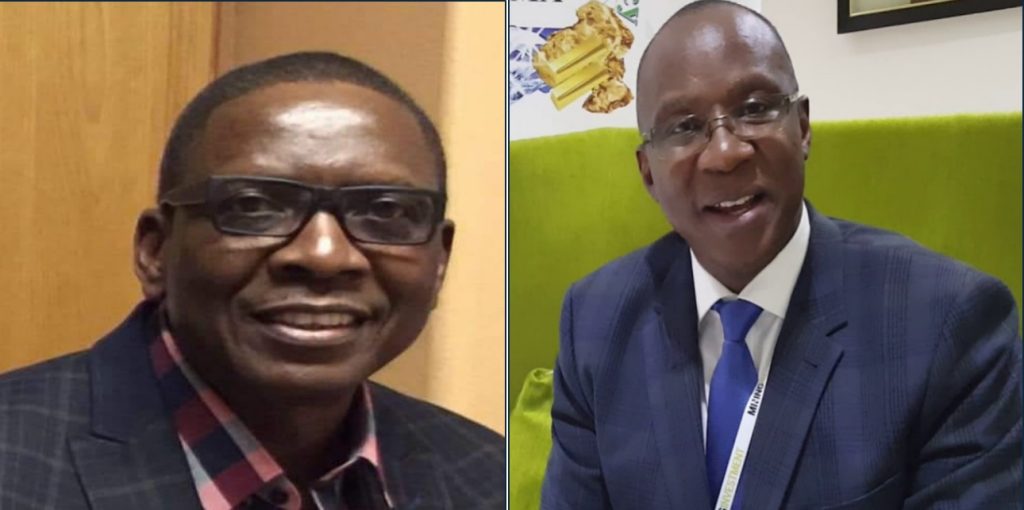Hadji Dabo, Director General, National Minerals Agency Minister of Mines and Mineral Resources, Julius MattaiIn Sierra Leone, the Ministry of Mines and Mineral Resources and the National Minerals Agency (NMA) are under increasing scrutiny, as citizens voice their concerns over the lack of transparency regarding the companies currently operating in the country’s mining sector. Recent revelations surrounding an agreement with an American company, Elektros (OTC PINK: ELEK), have intensified calls for clarity and accountability in a sector that has historically been marred by issues of corruption and mismanagement.
On August 22, 2024, Elektros, a company that is rapidly establishing itself in the electric mobility market, announced that it had secured a 13-year ground lease for a lithium mining project in Gbu-bu village, Gawola Town, within the Tinkoko chiefdom of Bo District.
The company’s press release emphasized that the lease was intended not only for lithium extraction but also included plans to construct multi-family residential apartments for the workers engaged in the project. However, the lack of any response or clarification from the Ministry of Mines or the NMA regarding Elektros’ claims has raised significant concerns among the public, leading to speculation about the legitimacy of the agreement.
As the situation unfolded, Elektros further announced on September 23, 2024, that it had begun the initial shipments of raw lithium aggregate from its mining site in Sierra Leone.
This development was touted as a major milestone in the company’s strategic supply chain for lithium, with truckloads of unprocessed material reportedly being transported from the southern Sierra Leone site to the city of Bo. From there, the lithium aggregate is expected to be shipped to the United States for processing, a move that aligns with Elektros’ objective to meet the escalating global demand for lithium, particularly in the electric vehicle and energy storage sectors.
In response to the growing public interest, the NMA issued a statement denying any dealings with Elektros. However, the agency’s failure to disclose the names of other companies currently exploring lithium resources in Sierra Leone only added to the public’s frustration. Citizens are left questioning the authenticity of the agreements made between the Ministry, the NMA, and Elektros, raising concerns about the potential ramifications for Sierra Leone’s natural resources and economic prospects.
A visit to the NMA’s official website reveals a troubling lack of information about active mining companies. While the site provides data on the total number of active licenses, applications, and expired licenses, it conspicuously omits the names of companies currently operating in the mining sector. This absence of accessible information has led to further inquiries into the operations of the Ministry and the NMA, as citizens increasingly demand greater accountability from their government.
The mounting pressure on the Ministry of Mines and the NMA to disclose the names of all active mining companies in Sierra Leone is palpable. The public’s frustration is understandable, especially considering the significant mineral wealth that the country possesses. Citizens are calling for a more open dialogue regarding the agreements made with foreign companies, particularly concerning their potential impact on local communities and the environment.
As the public continues to seek clarity on these opaque agreements, the Ministry of Mines and the NMA are facing an urgent need to provide comprehensive information about the operations of mining companies in Sierra Leone. The demand for transparency is more pressing than ever, as citizens strive to comprehend the implications of these agreements on their nation’s resources and economic future.
This situation raises broader concerns about the governance of natural resources in Sierra Leone, a nation that has faced numerous challenges related to corruption, lack of accountability, and mismanagement of its mineral wealth. The call for transparency in the mining sector transcends the mere disclosure of company names; it is fundamentally about ensuring that the wealth generated from the country’s natural resources benefits the citizens and contributes to sustainable development.
The ongoing developments surrounding Elektros, coupled with the responses from the Ministry of Mines and the NMA, underscore the critical need for transparency and accountability in Sierra Leone’s mining sector. As citizens continue to demand clarity on the operations of mining companies, the authorities must engage in open communication, providing the necessary information to restore public trust and ensure that the country’s mineral resources are managed responsibly and equitably.
Moreover, the implications of these mining operations extend beyond just economic factors; they also encompass environmental and social dimensions. The lack of information regarding the operations of mining companies raises concerns about potential environmental degradation and the rights of local communities. The government must prioritize the well-being of its citizens and the environment in its dealings with foreign investors in the mining sector.
As the public remains vigilant in holding authorities accountable, the call for transparency in Sierra Leone’s mining sector is not merely a demand for information; it is a fundamental right of the citizens to know how their country’s resources are being utilized. The government must recognize that the trust of the people is paramount, and transparency is the key to rebuilding that trust.
The situation surrounding Elektros and the responses from the Ministry of Mines and the NMA highlight the urgent need for reform in Sierra Leone’s mining sector. The citizens’ demand for transparency is a clarion call for accountability and responsible governance. As the nation grapples with its rich mineral resources, the authorities must act in the best interests of the people, ensuring that the benefits of these resources are shared equitably and sustainably. The next steps taken by the Ministry and the NMA will be closely watched, as the public continues to advocate for a mining sector that serves the interests of all Sierra Leoneans.
